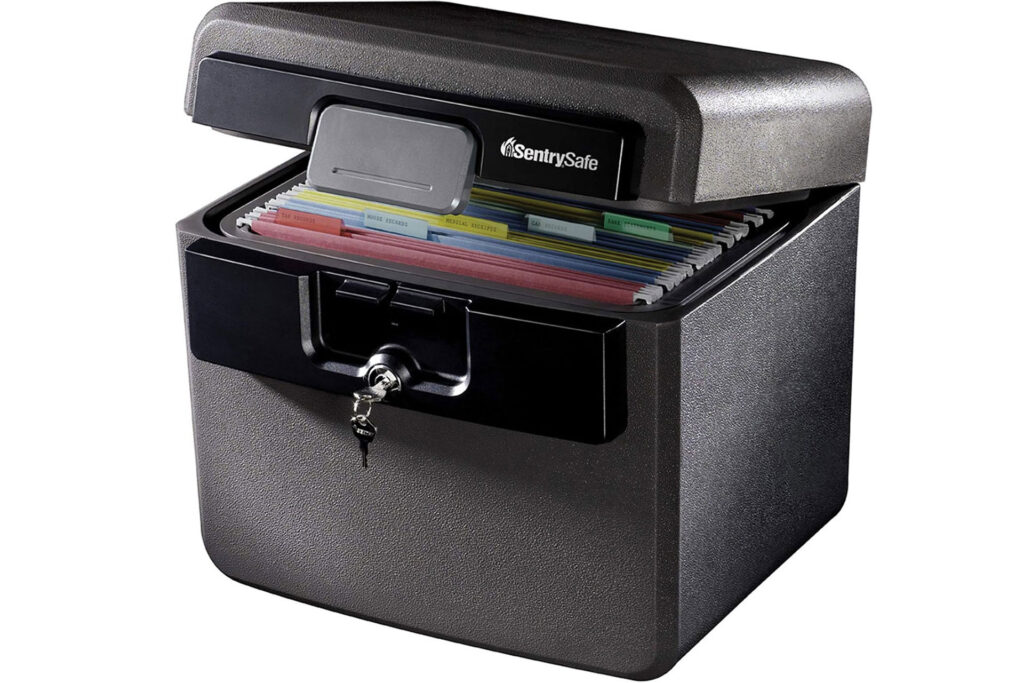Let’s Recap
In step one of this guide, we discussed the importance of familiarizing yourself with your home, your neighborhood, and your city. Becoming familiar with your home is the first step, because it will help you understand what needs to be done. Becoming familiar with your neighborhood and city will help you understand how to accomplish your goals, but before you can accomplish them, you need a plan. That’s where the paperwork come in.
STEP 2: PAPERWORK
First thing’s first, when moving into a new home, you’ll need to change your address. Remember to change it for all of the following:
- IRS
- DMV
- USPS
- Place of Work (Possibly Associates)
- Family & Friends
- Doctors & Dentists
- Financial Institutions
- Insurance Providers
- Phone/Cable/Internet
- Subscriptions, Services, & Memberships
- Apps (Maps, Uber, Lyft, Smart-Home Apps)
Organize & Protect your Documents
We all have important paper documents, such as a marriage license, birth certificates, social security cards, diplomas, tax records, etc. With your new house, comes new documents that you’ll have to keep up with, and it’s best to have them all in one safe place. I recommend keeping them in a fireproof, waterproof file-safe, so no matter what, your important documents will not be damaged.
Create 4 folders for your House
Once you have a file-safe, it’s time to create four new folders, labeled “Proof of Ownership”, “Financial Documents”, “Maintenance Records”, & “Other Documents”. Each folder will contain many documents. I’ll list a few for each, but keep in mind that this is not an exhaustive list. Also, feel free to organize these documents however you want. I am simply trying to emphasize the importance of organizing and maintaining your paperwork.
- Proof of Ownership
- Deed – You’ll have a deed for your new home, regardless of whether or not you had to get a loan. A loan simply indicates that your lender has a financial stake until the loan is repaid, but you’ll keep the legal title and ownership represented by the deed. The primary function of the deed is that it’s the legal document that transfers ownership of real property to you and allows you to sell your house to someone else in the future. The secondary function is that it defines any restrictions or legally binding limitations on how the property can be used. Many restrictions are put in place to maintain standards in the community, such as architectural styles, land use, or building heights.
- Promissory Note – If you have a loan, this document signifies your promise to repay the loan. It includes details like the loan amount, interest rate, repayment schedule, and penalties for default.
- Mortgage Documents – These documents secure the promissory note by offering the house as collateral. They outlines the terms of the loan, your obligations, and the lender’s rights if you don’t pay, including their right to foreclose.
- Loan Estimate & Closing Disclosure – Respectively, these documents outline loan terms, interest rates, and closing costs, & provide an itemized list of all the fees and costs associated with closing.
- Title Insurance Policy – (Not Homeowners Insurance) This policy protects you and lenders from financial loss, due to title defects that existed before the house was purchased. It safeguards against issues like unpaid property taxes, fraud, forgery, etc.
- Financial Documents
- Property Tax Records – Now, these records are created, stored, and maintained by the local appraisal district office. However, your responsibility is to pay them on time. I recommend keeping a copy of these records, along with any bills, so you can always be aware of any discrepancies and always pay on time.
- Homeowners Insurance Policy – These policies vary greatly, depending on the agency and the area. They typically covers damage to the structure of the house, personal belongings, and liability coverage for accidents on the property. It is vital you clearly understand what your specific policy covers, and have easy access to this document when you need it.
- Mortgage Payoff Statement – This document details the exact remaining balance to fully pay off the mortgage loan. It includes the principal balance, accrued interest, and any potential fees. This statement is crucial for financial transactions like refinancing, selling, or paying off your mortgage early.
- Maintenance Records
- Home Inspection Report – This document, provided by Upright Professional Inspections, contains detailed information regarding safety concerns, current deficiencies, and the life expectancy of big-ticket items, such as roof coverings, AC units, and water heaters. It’s important to refer to while you’re budgeting. The report will be provided in a .pdf format, and you will have to print it yourself.
- Appraisal Report – This document outlines your property’s estimated market value. It also includes a description of the property, an analysis of comparable sales, and the appraiser’s opinion of the value. You may not need this one, but it will definitely be interesting to look at, if you want to sell your house in 20 years.
- Maintenance Records – It doesn’t matter if you are digitally inclined and want to create a spreadsheet or if you’d rather have paper copies, the important thing is that this document gets created. It should keep records of all maintenance, repairs, and upgrades made to the property (not just the house). It should also contain contactor information, receipts, and maintenance schedules. Keep in mind that ink printed on receipts tends to fade, so consider scanning your receipts and printing a copy of them.
- Maintenance Budget – We will discuss the budget in greater detail later, because this will lead us to our final step in this guide. For now, let me simply say that it’s important to create a budget, and keep it in a safe place. The rule of thumb is to set aside 1-4% of your home’s value annually. I recommend setting aside 5%, so you have a little extra which can either act as a safety net or a larger allowance for upgrades.
- Other Documents
- HOA Documents – These documents will outline the rules, regulations, and operational procedures of the community. Understanding them is crucial for homeowners to know their rights and responsibilities within the HOA.
- Purchase Agreement – This document is a legally binding record of the sale of the house from the seller to you. It protects both of you by outlining the terms and conditions and preventing future disputes. It’s essential, because it clarifies responsibilities and can outline timelines for the entire process. You need to keep it, just in case there are any future disputes.
- Agent Representation Agreements – This document outlines the terms of your professional relationship with your real estate agent. It clarifies your agent’s responsibilities and how they will be compensated. This is an important document, but I recommend asking an attorney can tell you how long you need to keep it.
- Accounts Spreadsheet – The last important document I recommend having in this folder is one which you will need to create. It’s a document which states all of your service providers and their phone numbers, along with your account numbers. Now, you need to have a digital version of this as well, but it also helps to have a printed version for easy access while you’re on the phone. Here’s a link to a google-sheets template I created:
Once you have all these documents organized, it will provide peace of mind. You will always know where they’re located and have easy access to them. It will also be much easier to maintain your paperwork, if you start off with a good system.
Create a Budget for your House
Creating a budget for your house helps you be financially prepared for the maintenance, repairs, and upgrades. Being financially prepared can actually save you money! For instance, let’s say you don’t have any money set aside for repairs, and suddenly find out about a leaky pipe. That simple leak could turn into damaged insulation, stained drywall, or even rotten structural members. As I stated earlier, the general rule of thumb is to set aside 1-4% of your home’s value annually. I recommend setting aside 5%, so you have a little extra which can either act as a safety net or a larger allowance for upgrades.
You can refer to the professional home inspection report provided by Upright Professional Inspections, when you create the budget for the house. As you create the list of maintenance, repairs, and upgrades on paper or a spreadsheet, be sure to highlight the safety deficiencies that need to be addressed first. Then, add an estimated cost of repairs to each item. Finally, organize your list in a way that reflects your own priorities for safety, practicality, and desire.
Most likely, you aren’t going to be able to afford doing all of the repairs at once. In fact, most homeowners aren’t, and that’s okay. Every homeowner has to create a budget and live within their means. Don’t over-extend your finances, and remember that unexpected expenses will come up. Your budget should have money designated for expected repairs, as well as money designated for unexpected repairs. Newer homes should not have as many unexpected repairs as older ones, but they all will. I recommend designating a minimum of $20/month to your unexpected repairs fund.
Once you’ve created a budget and seen how much everything is going to cost, it’s only normal to become a little worried. Remember, it’s not a race to accomplish everything. You don’t have to compare yourself or keep up with the Jones’. Just take things one day at a time, and stick to your plan. You will be okay.
“Don’t worry about tomorrow, for tomorrow will worry about itself. Each day has enough trouble on its own.”
I hope you enjoyed the first two parts of this guide. In the next and final part, I will discuss practical ways to take care of the maintenance, repairs, & upgrades of your house.

